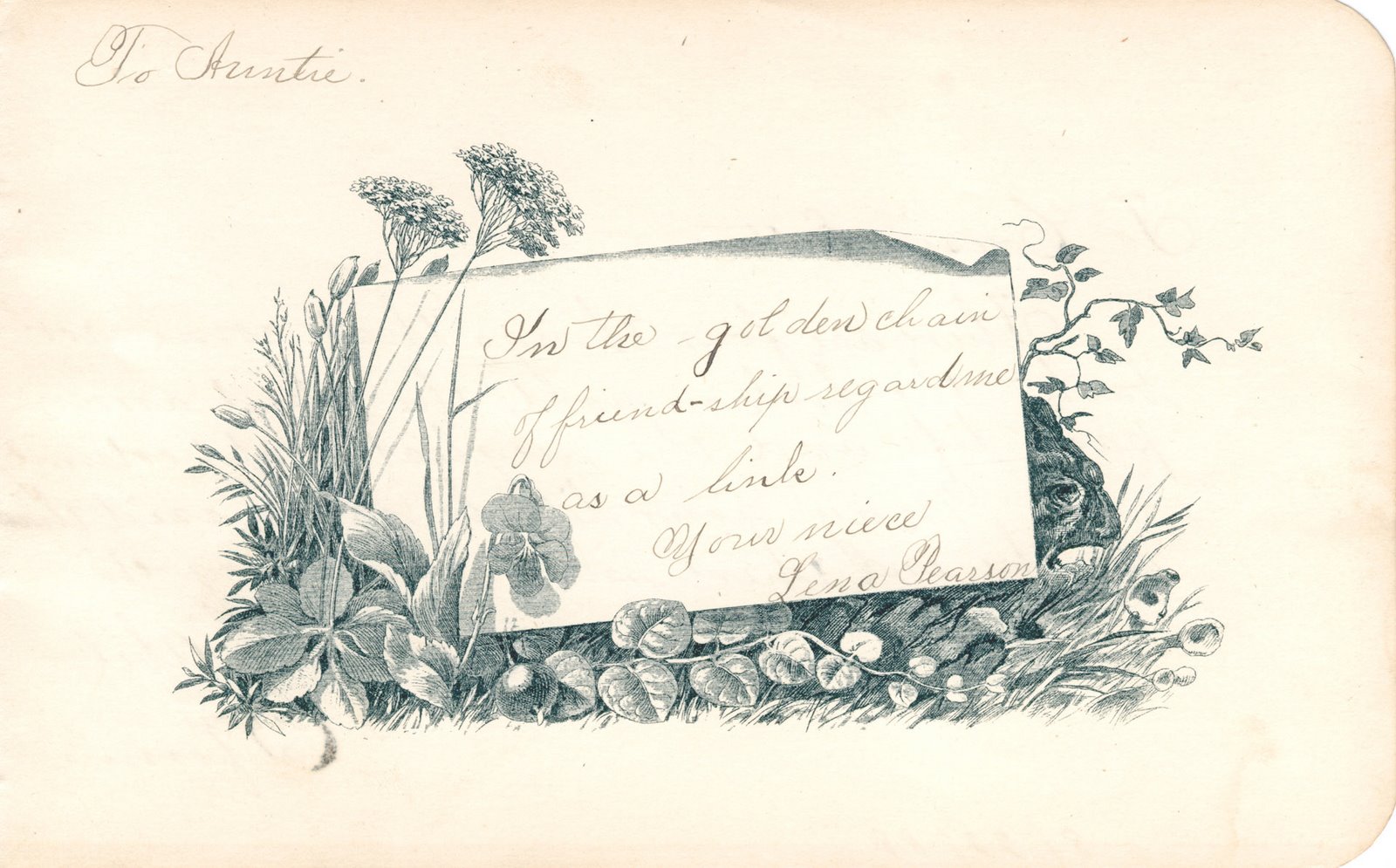Your cart is currently empty!

Cultivating Natural Text Links
“In the golden chain of friendship,” this Victorian card says, “regard me as a link.”
The writer probably wasn’t talking about hyperlinks, but her words apply. Links to your website are a friendly thing, and they’re golden as far as your search rankings go.
People will link to your website just because it has good stuff and they like it. I have links like that in this blog — just stuff I think might be useful and interesting to you.
You can get links of that kind by having good stuff at your website, and having the good fortune to have people drop by who like your stuff. Nearly all the links to my educational blog are of that kind: somebody wanted to share a lesson plan on wolves, and there I was. Most of the links from my educational blog are like that, too. Those are natural links.
You can get those natural links by having good stuff and pointing it out to people, and asking for links from them. That’s definitely a place where friendship comes in. We see good stuff at the websites of people we know and like, and we link to them in a friendly way. We can even ask our friends for links for friendship’s sake. We can ask total strangers for links, too, by pointing out how valuable our website could be to their readers. I do that for clients, and often have responses thanking me for pointing out that valuable resource.
But you can also sometimes put links someplace yourself. If you have a blog, or make a website someplace, you can create links which — while natural in appearance — are not entirely natural. You might think of them as cultivated links, or maybe cultured links, like cultured pearls.
I’ll tell you frankly that I put links to my clients in this blog.
But there is a difference between a cultured pearl and a plastic bead. There’s a difference between golden links of friendship, or even gold-plated ones, and base metal. Allow me to share some simple rules for getting that natural look with your text links.
- You still need good content. When I first became responsible for making an employer’s online store profitable, I had a terrible time finding the kind of information I needed. It’s not that information about online marketing wasn’t on the web, but it was not written for people like me. It required special vocabulary to read it, and it wasn’t about the things that I needed to know. That’s why I write this blog — now that I know these things, I want to share them with people in the position I used to be in. I do put links for my clients into my blog posts, but only as useful examples in useful posts. You’re facing the same kinds of issues that they are, after all. You might even be one of my clients yourself. When you decide to place links in your text, don’t forget the main reason you’re writing.
- You still need natural language. I sometimes find myself looking at those “articles” composed of links. “Need a wedding planner?” they say, “Solve all your wedding planner needs with the best wedding planner in Grand Falls and the Grand Falls area!” Nobody’s going to read that stuff. Readers say to themselves, “Ah, this is one of those articles composed of links.” Then they go somewhere else. If you can’t put links into your writing without sounding like that, then you should hire someone like me to do it for you.
- You need honest, worthwhile links. This point may seem like an odd one. You’re linking to something for which you want links, right? Probably your own website. Naturally it’s worth linking to! But think about your reader. If I’m reading your blog post or article and I click off to a link you’ve offered me and it turns out to be a useful addition to what I’ve read, I’ll appreciate you. I’ll come back and read some more. So, when I write blogs for people, I like to add links to other pages on their websites. But I make sure that these are useful links, and clearly identified.

- Here, for example, we have a link in Part II of a series to Part I of that series. Someone who has come to Part II via search might want to read Part I, and they can tell from my link’s anchor text that this is where they’ll end up. I also have a link to the section of the client’s website that discusses how they build successful websites. That link saying “successful web sites” isn’t going to take my reader to a pitch for cheap web hosting or a get-rich-quick scheme; it’s an honest link. I’ve linked the phrase “anchor text” to one of my earlier posts on the subject, too, because I think there may be people reading this who don’t know what that means, and who will find an explanation helpful. If I were going to link to a site with cheap web hosting, because sometimes that’s what you want, I’d link with the phrase “cheap web hosting,” so my readers would know where they were going to end up if they clicked the link.
If you’re in a position to place links for your website, good for you. Do it. Just make sure you do it right. Then your links will be part of that golden chain of friendship, not an irritation to your readers.
by
Tags:
Comments
2 responses to “Cultivating Natural Text Links”
-
Rebecca, this is a great post very informative and easy to read.
I have subscribed to your RSS feeds. -
Well, thank you.
I enjoy your posts over at Sitepoint!

Leave a Reply